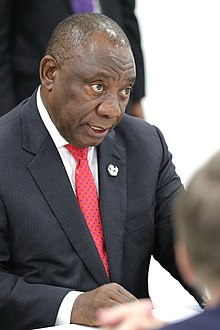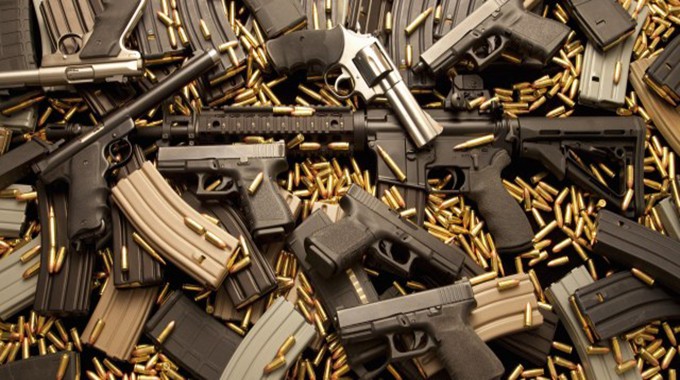The rand went into free fall on Thursday afternoon as the country awaited the fate of President Cyril Ramaphosa after the release of a damning report by a panel led by former chief justice Sandile Ngcobo on the Phala Phala farm scandal.
After weakening as much as 4% to the dollar, the most since June 2020, when the country was in the midst of the hard Covid-19 lockdown, the rand later recovered some of those losses. At 8pm it had weakened 2.16% to R17.58/$, 3.26% to R18.47/€ and 3.7% to R21.54/£. The banking index on the JSE fell more than 8% on the day.
The yield on 10-year rand-denominated debt surged 91 basis points to 11.71%, the mos tin a day since former president Jacob Zuma’s axing of Nhlanhla Nene as finance minister in December 2015 roiled markets.
“The market is reacting negatively, but if Cyril Ramaphosa’s position is so compromised that he’s looking to resign, it shouldn’t be too bad for SA assets,” said Cristian Maggio, head of portfolio and ESG strategy at TD Securities.
“The market dreads political instability and often prefers to go with the devil they know than the devil they don’t.”
Ramaphosa, who was widely expected to address the nation on his response to the section 89 report amid heightened speculation that he would announce his resignation, dug in.
His spokesperson, Vincent Magwenya, said the president was still consulting widely and his decision cannot be rushed. It needed to be informed by the best interests of the country.
Ramaphosa, whose back is against the wall with his opponents inside and outside the ANC calling for his resignation, opted to weigh his options further before announcing his decision on the way forward.
The panel found the president may have committed serious violations of the Prevention and Combating of Corrupt Activities Act and the constitution “by exposing himself to a situation involving a conflict between his official responsibilities and his private business”.
That means Ramaphosa could face an impeachment process. It also throws a spanner in the works for his prospects for re-election as ANC president when the party convenes for its elective conference in two weeks.
The panel found the president may have committed serious violations of the Prevention and Combating of Corrupt Activities Act prevention of crimes act and the constitution “by exposing himself to a situation involving a conflict between his official responsibilities and his private business”.
Magwenya said at a media briefing on Thursday night: “He is engaging a number of role players and stakeholders across the governing party … different levels of the [ANC-led] alliance and he is engaging a broad range of stakeholders in appreciation of the enormity of the matter.”
Business Day understands that on Thursday afternoon Ramaphosa — who cancelled all public engagements after the release of the report on Wednesday night — held a meeting with his allies in the ANC and closest political advisers.
He is said to have told them that he was not opposed to stepping down over the scandal. Ramaphosa has staked his presidency on an aggressive implementation of his reform agenda, which includes bringing in more private sector participation in state-owned entities and rooting out corruption.
The ANC national executive committee (NEC), the party’s highest decision-making body between national conferences, is expected to hold a meeting in Johannesburg on Friday to chart a way forward.
ANC spokesperson Pule Mabe said the Ngcobo report is the only item on the agenda.
Business Day understands that Ramaphosa is likely to inform the NEC of his decision to either step down or take a leave of absence at Friday’s meeting.
“It seems he recognises the gravity of the matter and doesn’t want to undermine the principle here,” said one ANC NEC member who declined to be named.
“Those discouraging him from stepping down are acting out of self-preservation and self-interest. Their views and motives are devoid of principle,” said another NEC member sympathetic to Ramaphosa.
Opposition parties in SA were united in their call for Ramaphosa to resign, with the DA going as far as to call for a nearly national election.
“Even if the report is overturned, he would be staying in office for the sake of staying in office,” another ANC NEC member said. It is likely that the president will be advised to take the report on review.
The panel was appointed by National Assembly speaker Nosiviwe Mapisa-Nqakula in September to make a determination on whether Ramaphosa has a case to answer on the Phala Phala scandal.
The other members were retired judge Thokozile Masipa and advocate Mahlape Sello. “We think that the president has a case to answer on the origin of the foreign currency that was stolen, as well as the underlying transaction for it,” said the report by the panel.
“There are weighty considerations which leave us in substantial doubt as to whether the stolen foreign currency is the proceeds of [a] sale.
“This is a very serious violation which, if established, renders the violation [of] section 96 of the constitution and the Prevention and Combating of Corrupt Activities Act, a serious violation and a serious misconduct,” it said. With Bloomberg














